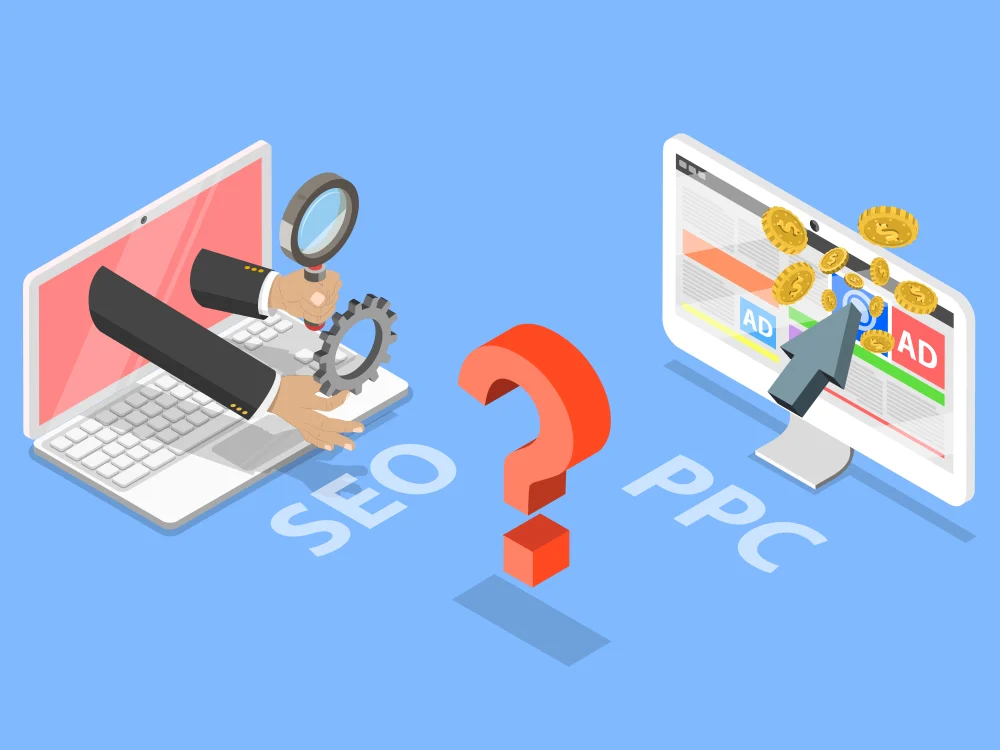“Understanding the Difference: SEO vs. Google Ads” is fantastic. It clearly addresses your intended audience (newcomers to digital marketing) and appropriately represents the material.
Here’s a description of the differences between SEO and Google Ads, as well as solutions to relevant questions:
What is Search Engine Optimization?
Search engine optimisation (SEO) is the process of increasing the quality and quantity of visitors to a website or web page via search engines. SEO prioritises unpaid traffic above direct or paid visitors.
Simply said, SEO is the process of optimising your website so that it is more visible when people search for items or services linked to your business. The higher your website ranks in search results pages (SERPs), the more people will visit it.
There are two primary types of SEO:
- On-page SEO relates to optimising your website’s content and structure. This comprises keyword research, title tag and meta description optimisation, content development, and internal linking.
- Off-page SEO is the optimisation of your website’s popularity and reputation. This covers activities like as link development, social media marketing, and online reputation management.
What is Google Ads?
Google Ads is an internet advertising network created by Google. It enables businesses to generate ads that show across many Google properties in order to attract potential customers who are interested in the products or services they offer.
Here’s an explanation of how it works:
- Reaching Potential Customers: You may set your ads to appear when people search for certain terms (keywords) linked to your business on Google Search. This ensures that your adverts reach those who are already interested in what you have to offer.
- Beyond Search Ads: Google Ads provides more ad types than just search results. You may design display advertisements for partner websites, video ads for YouTube, and even shopping ads to promote your products.
- Pay-Per-Click (PPC): Unlike SEO (Search Engine Optimisation), which focuses on organic traffic, Google Ads uses a pay-per-click strategy. You allocate a budget and bid on keywords. When someone clicks on your ad, you pay a tiny fee.
Overall, Google Ads is an effective tool for businesses to increase online visibility, drive traffic to their website, and eventually produce leads or purchases.
SEO vs. Google Ads: A Breakdown
Search engine optimisation (SEO) and Google Ads (previously known as AdWords) are two effective ways to increase traffic to your website. However, they operate in fundamentally distinct ways:
- SEO is the organic process of optimising your website and content to appear higher in search engine results pages (SERPs) for relevant keywords. When consumers search for keywords relating to your business or niche, your website is more likely to appear towards the top of the search results, resulting in free traffic.
- Google Ads is a paid advertising platform that lets you design ads and bid on keywords. When visitors look up those terms, your ad may show at the top of the search results, above organic listings. You pay every time someone clicks on your advertisement.
Benefits of Learning SEO Before Google Ads
There are various advantages to learning SEO before going into Google Ads.
- SEO is a long-term strategy: once you get high organic rankings for relevant keywords, you will continue to gain visitors without having to pay for each click.
- Strong SEO increases brand credibility: When your website ranks well organically, search engines see it as a useful resource, which can strengthen your brand’s reputation.
- SEO knowledge influences Google Ads campaigns: Understanding how search phrases operate and what people look for might help you produce more focused advertisements.
How Google Ads Complements SEO
While SEO provides long-term benefits, results may take some time to appear. Google Ads can be an effective technique to:
- Drive immediate traffic. Get your website in front of potential clients while you work on your SEO foundation.
- Target specific keywords: Reach out to users who are searching for highly relevant terms that you may not yet be ranking for organically.
- Test and tweak your messaging: Use Google Ads to experiment with alternative ad wording and landing pages to determine what works best with your target audience. These findings can then be applied to your SEO campaigns.
Can You Learn SEO and Google Ads Simultaneously?
Absolutely! While both have their own complexity, there is a lot of overlap when it comes to understanding user search intent and creating effective marketing messaging. You can start with the fundamentals and work your way up to the more complex aspects.
SEO Services in Bangalore vs. Other Regions
The efficiency of SEO services varies based on the competition of your niche and the SEO agency’s skill. However, geography is rarely a substantial factor. A qualified SEO agency in Bangalore can deliver the same level of service as one in another region, as long as they have a thorough awareness of your target demographic and the worldwide search engine landscape.
Here are some extra factors to consider for your content:
- Provide real-world instances. Showcase how firms have successfully used SEO and Google Ads to reach their marketing objectives.
- Provide practical tips: Provide actionable strategies for beginners to improve their SEO and Google Ads expertise.
- Address common misconceptions. Clear out any confusion between organic and paid search results.
By offering a clear, informative, and beginner-friendly explanation, you may assist your target audience in developing a strong understanding of SEO and Google Ads.


